Saints Cyril and Methodius—“Evangelizers of the Slavs and Equal to the Apostles”
In the middle of the ninth century, Saint Prince Rastislav (r. 846–870), the ruler of the Slav state of Moravia (now in the Czech Republic), sent a request to Byzantium asking for missionaries to bring the Christian Faith to his people in their own language. Frankish missionaries using Latin had already been at work in his land, but he realized that the Faith would be much more meaningful to his people if they could have the Scriptures and the liturgical services in their native tongue. He also wanted to strengthen the alliance his nation had recently formed with Byzantium, against possible encroachment by the Frankish Holy Roman Empire directly to the west of his realm.
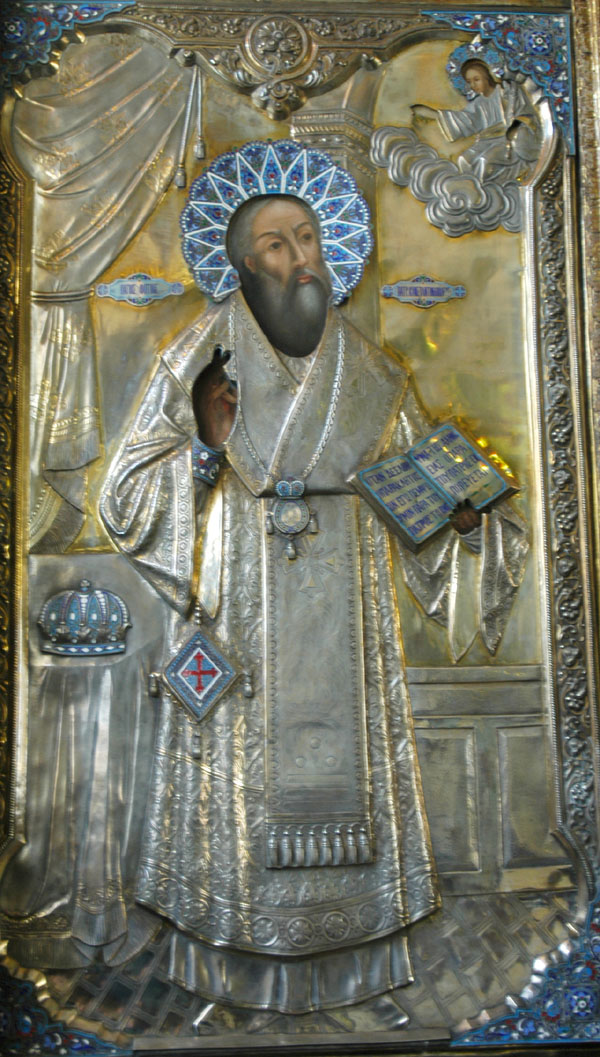
In response to Prince Rastislav’s request, Emperor Michael III (r. 842–867) and Patriarch Saint Photius the Great of Constantinople sent two devout and well-educated brothers named Constantine and Methodius as missionaries to Moravia. From an aristocratic family, these brothers had grown up in Thessalonica, where many Slavs lived, from whom they learned the Slavic language. They even had already done some preliminary work in trying to develop an alphabet for that language. And they had previous diplomatic and missionary experience. So they were ideal candidates for the mission to the Slavs.
Before arriving in Moravia in 863, Constantine had finished developing the first alphabet for the Slavic language. Called Glagolitic, it had highly unusual characters, unlike those of any other language. In Moravia the brothers used this alphabet in translating Church books into the Slavic language, which came to be known as Old Church Slavonic. They taught the alphabet and literacy, introduced the use of Slavonic in the Church services, and began training men for the diaconate and priesthood as the first step in raising up a native clergy for the Moravian Church.
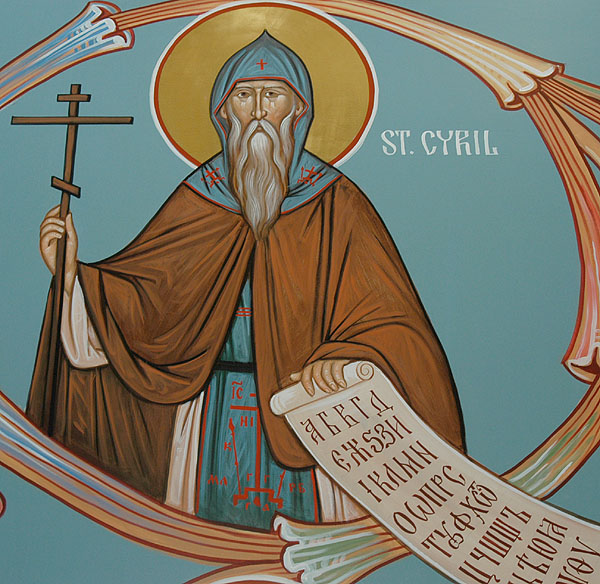
The mission of Constantine and Methodius created hostilities with the Frankish missionaries from the Latin Church who had come to Moravia earlier. These missionaries insisted that Church services should only be done in Latin, and that only Latin (Roman) customs and traditions should be used by the Slavic Christians.
In 867 the brothers traveled to Venice with some of their Moravian disciples, hoping to find a bishop to ordain these disciples as priests and deacons. In Venice they were sharply opposed by Latin clergy who insist that the services may only be celebrated in Latin, Greek, or Hebrew. In response, Constantine called this the “Three-Language Heresy”; he quoted 1 Corinthians 14 in defense of the use of the vernacular language in the Church services.
At this point the brothers were invited to Rome by Pope Nicholas, who was anxious to bring the Greek mission to the Moravians under his control. By the time they arrived, however, Nicholas had died, but they were received with great acclaim by his successor, Pope Hadrian II (r. 867–872). Pope Hadrian allowed the brothers to celebrate the Roman liturgy in the Slavonic language, and at least once he participated in such a service.
Constantine died early in 869, while still visiting Rome. Shortly before his death he became a monk, taking the name of Cyril. It is by this name that he is known as a saint of the Church. Before he died he begged his brother to continue the holy work among the Slavs. Methodius promised to do so.
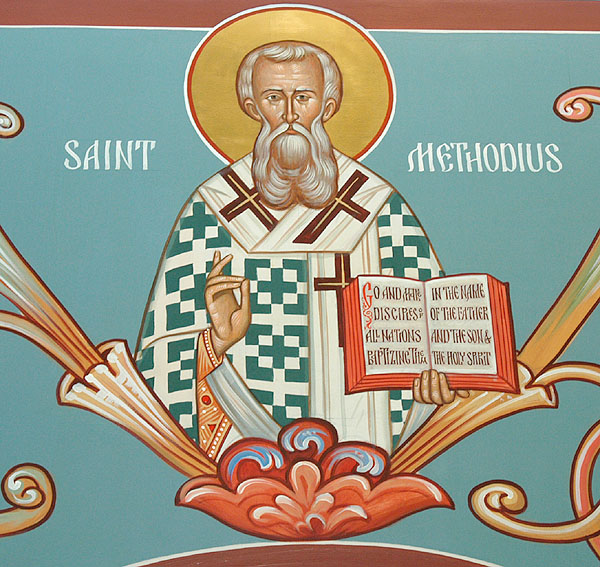
Soon thereafter, Methodius was consecrated by Pope Hadrian as Archbishop of Pannonia and Moravia, with full authorization to continue using Slavonic in the Church services. However, when Archbishop Methodius returned to Moravia, he was arrested and imprisoned by the Frankish-Germanic clergy with the support of Rastislav’s successor, the pro-German usurper Sventopulk, and Louis the German, the Holy Roman Emperor. In 873, when Pope John VIII (r. 872–882) learned what had happened to Archbishop Methodius, he demanded and managed to obtain his release. But the Roman Church was unwilling to give much direct support to Methodius, for fear of offending the expanding Frankish and Germanic powers.
Despite repeated harassment by the German clergy, Methodius continued to promote Church life in the Slavonic language in Moravia for twelve more years, until his death in 885. Then Sventopulk moved fiercely against Methodius’s many disciples. Most of them were arrested, exiled, or even sold into slavery. Some of them, including a number of exceptionally talented missionaries, escaped into Bulgaria.
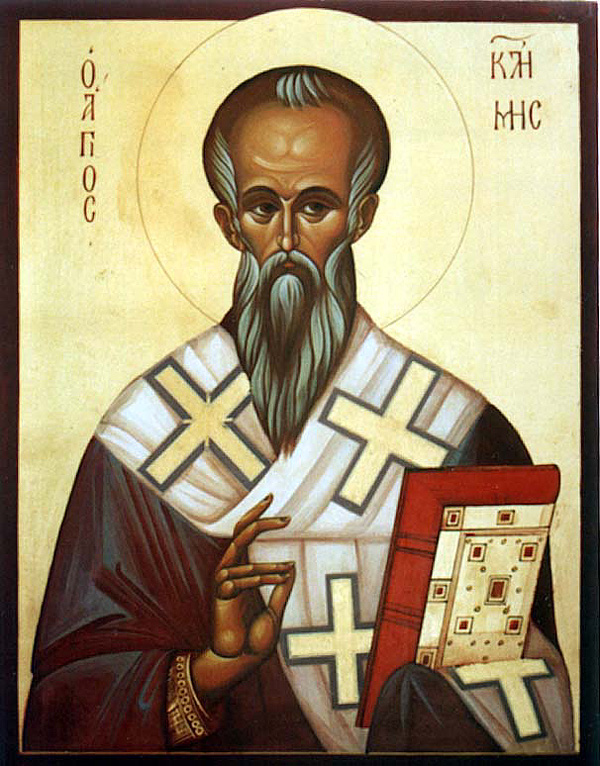
Led by their leader, Saint Khan Boris (r. 852–889), the Bulgarians had embraced the Christian Faith in 865 at the hands of Greek clergy from Byzantium. The Bulgarian Christians were delighted when Methodius’s disciples entered their land, bringing the services in Slavonic, which they much more readily understood than Greek. In 893, the Bulgarians officially adopted Slavonic as the official language of both their Church and State.
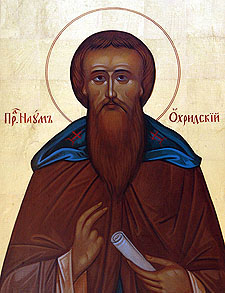
Saints Clement and Naum did outstanding missionary work among the Bulgarians. Most likely it was another of Saint Methodius’s disciples, Constantine of Preslav, who developed a second alphabet for the Slavonic language, based on letters mostly adapted from the Greek alphabet, making it more readily accessible than the Glagolitic alphabet. Constantine named his alphabet Cyrillic in honor of St Cyril, and it is this alphabet which continues to this day to serve the nations of Bulgaria, Serbia, Russia, Ukraine, and Byelorussia, as well as the Czech, Slovak, and Polish Orthodox Christians.
